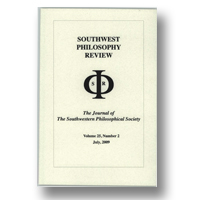|
21.
|
Southwest Philosophy Review:
Volume >
37 >
Issue: 1
Tanner Hammond
Objective Purport, Relational Confirmation, and the Presumption of Moral Objectivism:
A Probabilistic Argument from Moral Experience
abstract |
view |
rights & permissions
| cited by
All else being equal, can an objective-seeming character of moral experience support a presumption in favor of some form of moral objectivism? Don Loeb (2007) has argued that even if we grant that moral experience appears to present us with a realm of objective moral facts—something he denies we have reason to do in the first place—the objective purport of moral experience cannot by itself provide even prima facie support for moral objectivism. In what follows, I contend against Loeb that granting the objective purport of ordinary moral experience is sufficient to shift a presumptive case in favor of moral objectivism, and this by constituting non-explanatory, relational confirmation that incrementally raises the prima facie probability that moral facts exist. More specifically, I appeal to a modest confirmational principle shared by Likelihoodists and Bayesians—namely, the Weak Law of Likelihood—in an effort to show that (i) at a minimum, granting the objective purport of moral experience establishes a middling scrutable probability for a sufficient but not necessary condition of moral objectivism being true, and that (ii) this moderate probability in turn constitutes evidence that makes it prima facie more probable than not that at least some form of moral objectivism is true.
|
|
|
22.
|
Southwest Philosophy Review:
Volume >
37 >
Issue: 1
Jack Warman
Reflections on Intellectual Grandstanding
abstract |
view |
rights & permissions
| cited by
In this short paper, I present a philosophical account of intellectual grandstanding. In section 2, I identify a putative case of intellectual grandstanding. In section 3, I introduce Tosi and Warmke’s account of moral grandstanding (Tosi and Warmke, 2016, 2020). In section 4, I highlight some of the similarities and differences between intellectual and moral grandstanding. In section 5, I conclude by proposing some further lines of inquiry.
|
|
|
23.
|
Southwest Philosophy Review:
Volume >
37 >
Issue: 1
G. M. Trujillo, Jr.
The Benefits of Being a Suicidal Curmudgeon:
Emil Cioran on Killing Yourself
abstract |
view |
rights & permissions
| cited by
Emil Cioran offers novel arguments against suicide. He assumes a meaningless world. But in such a world, he argues, suicide and death would be equally as meaningless as life or anything else. Suicide and death are as cumbersome and useless as meaning and life. Yet Cioran also argues that we should contemplate suicide to live better lives. By contemplating suicide, we confront the deep suffering inherent in existence. This humbles us enough to allow us to change even the deepest aspects of ourselves. Yet it also reminds us that our peculiar human ability—being able to contemplate suicide—sets us above anything else in nature or in the heavens. This paper assembles and defends a view of suicide written about in Cioran’s aphorisms and essays.
|
|





